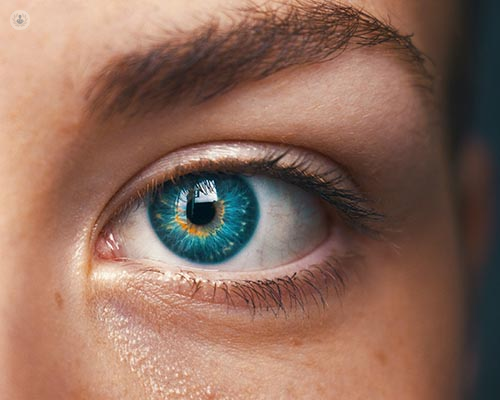The most common questions about cataract surgery
Written in association with:Cataract surgery is among the most frequently performed and highly successful surgical procedures globally. Cataracts are a natural part of the ageing process, and consist of clouding of the eye’s lens, causing blurry vision, glare, and difficulty seeing in low light. If you or a loved one is considering cataract surgery, it’s normal to have questions. Leading consultant opthalmic surgeon Mr Sameer Trikha addresses some of the most frequently asked questions to help you feel informed and comfortable with the process.

What is cataract surgery?
Cataract surgery is a procedure designed to remove the cloudy lens in the eye that causes blurred or reduced vision. During the procedure, a surgeon removes the affected lens and replaces it with a clear, artificial lens called an intraocular lens (IOL). This new lens allows light to focus correctly on the retina, located at the back of the eye, thereby restoring clear vision. The surgery is usually done under local anaesthetic as a day case, allowing you to go home the same day.
When should I consider cataract surgery?
Cataract surgery is usually recommended when cataracts begin to interfere significantly with your daily activities, such as driving, reading, or difficulty in general with the clarity of vision. In the early stages, cataracts may cause only minor vision changes that can be managed with stronger glasses or brighter lighting. However, as cataracts progress, they can reduce your vision quality and impact your independence. It is generally best to consider surgery once your vision loss starts to affect your quality of life, and when glasses no longer provide adequate correction.
How long does cataract surgery take?
The actual cataract surgery procedure is relatively quick, taking approximately 10 to 20 minutes per eye. However, you should plan to be at the surgical centre for about two to three hours to allow time for pre-operative preparation, post-operative recovery, and instructions. Typically, only one eye is operated on at a time to allow the other eye to continue functioning while the treated eye heals.
What lens options are available during cataract surgery?
Intraocular lenses (IOLs) come in various types, designed to address different visual needs. The most common types are:
- Monofocal lenses, which provide clear vision at a single distance, usually either near or far. You will still need glasses for other tasks.
- Extended depth of focus lenses, which provide a larger range of vision from the distance up to about 40cm
- Multifocal lenses can provide clear vision at multiple distances, potentially reducing the need for glasses.
- Toric lenses are designed to correct astigmatism, a common condition where the eye’s shape causes blurred vision. Toric lenses can be used in monofocal, extended depth of focus and multifocal lenses
Your surgeon will discuss your lifestyle and vision goals to help determine the best type of IOL for you.
How long does recovery take after cataract surgery?
Recovery from cataract surgery is generally quick, with many patients noticing improved vision within a few days. Full recovery usually takes about 4 to 6 weeks, during which time you should avoid strenuous activities, swimming, and environments with dust or strong wind to minimise the risk of infection. Most patients can resume normal activities, such as reading and watching television, within a few days.
Are there any risks or complications?
Whilst cataract surgery is generally safe, like any surgery, it does carry some risks. Potential complications include infection, inflammation, bleeding, and a rare risk of posterior capsule rupture, where the clear bag in which the cataract sits breaks or cannot support the new lens. However, most complications are treatable (with medication or further surgery) if addressed promptly. Following your surgeon’s aftercare instructions and attending all follow-up appointments can help reduce these risks.
Will I need glasses after cataract surgery?
Whether you’ll need glasses after cataract surgery depends on the type of intraocular lens chosen. If you opt for a monofocal lens, you may need glasses for reading or other close-up tasks. Multifocal or extended depth of focus lenses can reduce the need for glasses, but some patients may still require them for certain activities. Your surgeon will discuss realistic expectations with you based on the IOL chosen and your unique visual needs.
By understanding what to expect before, during, and after cataract surgery, you can make an informed decision that best suits your lifestyle and vision goals. Cataract surgery is truly transformative, and has helped millions regain clear sight and maintain independence.
You can schedule an appointment with Mr Trikha via his Top Doctors profile today.


